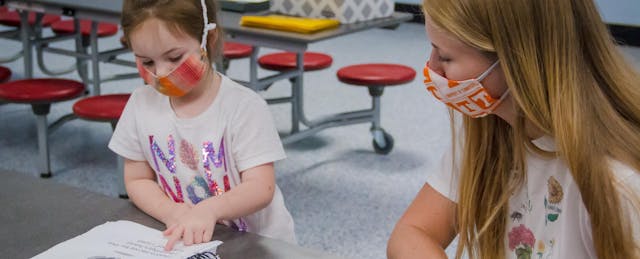Michelle Lamont’s 7-year-old daughter, Savannah, was already struggling with reading when her school shut down due to the coronavirus pandemic in March. The prolonged closures—and in her case, lack of any formal instruction—only exacerbated the problem.
Shortly after Savannah’s school, located in the rural town of Hampshire, Tenn., transitioned to remote learning, staff mailed out optional paper packets for students to work on for the remainder of the semester. The rest was entrusted to students’ parents.
Lamont and her husband accepted early on that they just didn’t have time to go through the worksheets with Savannah and their 6-year-old daughter Mia while juggling their two full-time jobs. The couple decided—mostly out of necessity—that the school year, in their house, had ended in March.
“My husband and I had to continue working. There was no time to sit down and work through the packet,” says Lamont. “There was no virtual or remote learning offered from the district. Everyone was caught off guard, completely.”
Savannah’s experiences were not atypical. According to an EdSurge/Social Context Labs analysis of 196 school district policies published during spring 2020, nearly two-thirds offered printed instructional materials to families to use for schoolwork, a figure that was higher among high-poverty districts than low-poverty districts. Over 40 percent of those 196 districts—which represent traditional public and charter school districts across different geographies, sizes and poverty levels—did not publicly divulge a synchronous remote-learning option.
From March to June, while their parents worked, Savannah and Mia passed their weekdays “going on field trips” with the family’s chickens around the house, playing outside and spending about an hour doing math and reading exercises on ABCMouse.com, which the school provided access to for free. Those activities kept them occupied, but Lamont and her husband began to worry that the girls—especially Savannah—would fall further behind, since they were both at critical ages developmentally and would be out of school for six months, if not longer.
“We were feeling so uncomfortable with Savannah going into second grade. And with no educational focus since March, it’s been a bit terrifying,” Lamont admits. “We want to make sure she has the confidence she needs [for reading], instead of being angry and frustrated and hating it.”
About 230 miles east of Hampshire, in Knoxville, Tenn., former Tennessee governor Bill Haslam and his wife, Crissy, were worrying about students like Savannah and Mia, whose educations were disrupted by COVID-19, and wondering if there was anything they could do about it.
In an ordinary year, when schools let out for the summer, many students experience learning loss—also known as “summer slide”—where their knowledge retention and cognitive development slows or recedes. As a result, the first few weeks or even months of the new school year are spent reviewing material from the prior grade. This year, with schools effectively closed all spring and summer, many educators and child development experts worry that the usual summer slide will be compounded by COVID-19 closures.
“It’s the reality of what happens in the summer: When students have no exposure to academic content, they fall further behind,” says Jayme Simmons, executive director of the Bill and Crissy Haslam Foundation. “And in the case of COVID-19, they will have only learned half-a-year of content from the prior year.”
In response, the Haslam Foundation launched a statewide tutoring program, the Tennessee Tutoring Corps. The program—held in-person all across the state—pairs college students with kindergarten through sixth graders in Tennessee to provide the older students with a paid summer job and the younger students with a chance to make up some of the learning and curriculum content that was either lost or never covered in the spring.
By adopting a tutoring model to address the summer slide, the Haslam Foundation was developing a program that district-initiated summer school programs don’t typically offer. The EdSurge/Social Context Labs analysis revealed that just four districts of 147 with published summer programs specifically mentioned tutoring in their descriptions.

Launching a Statewide Program During a Pandemic
Once the team at the Haslam Foundation started discussing the idea of a statewide tutoring program, in mid-April, the details had to come together quickly for it to work, says Simmons.
Within the first week, Simmons had put together a plan for launching the program on June 15. They worked backward from there. The Haslam Foundation staff opened applications for college students in mid-May, amplifying the opportunity by reaching out to higher education institutions in the state and contacting civic and education leaders. Then they had to figure out the logistics.
The staff decided to partner with the Boys & Girls Club, which has 80 sites across 30 of Tennessee’s 95 counties, so it could use the club’s pre-existing meeting spaces, source the students who need tutoring and facilitate the tutoring sessions.
The downside to the partnership, Simmons says, is that the Boys & Girls Club locations in Tennessee are concentrated in the eastern part of the state. In some counties, as a result, the tutoring program would not be available.

Also, due to the tight timeline, the Haslam Foundation only had about a week in June to train the tutors it had hired in May, which Simmons says was “good but not great.” In all, 600 college students were brought in to the Tennessee Tutoring Corps for the summer, earning up to a $1,000 stipend each.
It’s not enough money, Simmons acknowledges, to attract college students who have no interest in teaching or working with children. “One-thousand dollars isn’t ideal. It’s a part-time job,” she says. “But it’s an opportunity to be part of something bigger than yourself, to give back to the community.”
The application questions were designed to help the team identify students who “have a heart of service” or who may be open to pursuing a career in education.
“We would love, at the end of the day, if some of these tutors who otherwise weren’t thinking about it might consider the field of education,” Simmons says. “I think it’ll be pretty eye-opening for the tutors to see just how far behind a lot of these [K-6] students are.”
‘Helping Them in the Long-Term’
Aubrey Speer is a rising senior at Colorado State University but grew up in Tennessee. When she found out late in the spring that her internship with the City of Memphis’ criminal court was canceled due to COVID-19, she began looking for another way to spend her summer. Her dad, who works in Nashville for the state government, had heard about the Tennessee Tutoring Corps and encouraged her to apply.
Although Speer is pursuing a degree in political science with a focus on legal studies, the idea of tutoring children was not unfamiliar to her. She had taught civics to high schoolers when she was a freshman in college and says she’s considered teaching for a couple of years after graduation, before going to law school.
In addition to honing her communication and public speaking skills, Speer says she wanted to tutor this summer to try to help the kids she’s working with get back on track.
“I think the most valuable thing is that I’m helping them in the long-term,” she says. “Especially at this age, they’re gaining foundational skills. If they don’t get them—if they don’t understand these concepts—it’s going to be really hard for them to catch up.”
Speer says she tutors rising fourth-graders—between one and four children at a time, usually—at a Boys & Girls Club site in the Memphis area for about two-and-a-half hours a day, four days a week. She teaches both math and English language arts, following the curriculum that the Haslam Foundation selected, from the Nashville-based non-profit Instruction Partners.
The Tennessee Tutoring Corps is serving all K-6 graders who attend a Boys & Girls Club site in Tennessee, which is about 3,000 children total. Though many of those students are likely performing below grade level, Simmons says, the Haslam Foundation felt it was important to teach the kids the eight weeks of instructional content they would have received if schools had not closed in the spring. The Instruction Partners team, Simmons says, began developing such curriculum materials when schools closed in March and adapted their math and English language arts lessons for the tutors to use in their program this summer.
In addition to providing a rigorous, standards-based curriculum to children in the program, it was also important to the former governor and his wife that the tutoring be held in person, as they felt the college students could be good role models and possible mentors to the elementary-age students. The in-person element of the program was unusual. Among the districts that EdSurge/Social Context Labs examined at the beginning of summer, fewer than a dozen reported that they were planning to offer in-person summer school, and many of these plans were contingent upon a host of conditions or planned to target only specific student populations.
Speer says that at her site, social distancing guidelines are strictly enforced. She and the children she tutors all wear masks the entire time they’re together, and the children are seated six feet from one another.
Following these rules, she adds, can be a bit complicated. When she goes to check her students’ work in their workbooks, or provide one-on-one support to a student who is struggling with a concept, she has to get creative to avoid coming within six feet of them.
“That can be very challenging,” Speer says. “It’s easier to write the problem on the [dry-erase] board and let the kids get up with their markers and write the answer on the board, instead of using the workbook.”
At her Memphis location, Speer meets with students in an actual school building, so there is plenty of space for the handful of them to sit at desks and spread out. Other tutoring spaces throughout the state are utilizing tables in gymnasiums, auditorium seats and lunchroom-style round tables where the tutor sits on one side in a mask and the children are spaced around the other side, Simmons says.
‘It’s Been a Godsend’
Lamont, the mother of Savannah and Mia, has worked for the Boys & Girls Club of Maury County, Tenn., since 2017 and currently serves as the director of programs and recruitment. She says the Boys & Girls Club typically has a summer tutoring program, but it’s not as robust as the one the Haslam Foundation arranged.
“We’ve never tutored every single child, so this is a very unique opportunity for our organization,” she says.

Since Savannah and Mia both attend the Boys & Girls Club’s summer program, they were automatically signed up to participate in the Tennessee Tutoring Corps. And Lamont is glad they were.
“It’s been a godsend,” she says. Not only are her girls learning much of the material they missed out on in the spring when they were home and their parents were working, but the instructional content is taught in a way that really seems to be working for her daughters.
In school, Savannah was in Response-to-Intervention classes for reading, and there was “so much of a focus on getting her where she needed to be,” Lamont says. But in her tutoring sessions this summer, “there’s no pressure. It’s not being forced; she’s being guided. It’s a completely different atmosphere, a completely different learning environment.”

After just the first few weeks, Lamont notes, Savannah’s interest in reading blossomed—she went from refusing to pick up a book to now going out of her way at home to sit down and read for a while.
“It’s definitely sparked something in her. She has a greater desire,” Lamont says.
She adds: “Savannah has just experienced so much frustration, when it comes to reading in particular. To see her not have that frustration now, as we go into a new school year, is such a blessing. … Now she has a little bit more confidence and a whole lot more desire to want to learn.”


